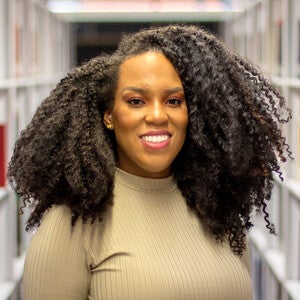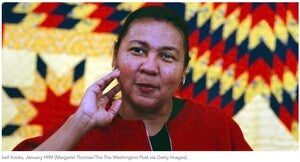
“Whether the issue is ending racism, sexism, homophobia, or class elitism, when I interview folks about what leads them to overcome dominator thinking and action they invariably speak about love, about learning acceptance of difference from someone they care about. (hooks, 2012)”
While Black women are in each part of history represented in these collections, a focus on the women that uplift households, movements, and communities can still be missing from archives. Hooks and others bring light to our existence and challenged the world’s relationship with us. Even if the contributions are just existing in the community, they are accomplishing the skill of survival with each other. Hooks has examined the role of love and ending domination (Hooks, 2012) and how our survival requires that we examine our relationships with each other.
Hooks passed away at the age of 69, December 15, 2021. Bell Hooks was in many ways my first formal introduction to Black feminism. It was informally absorbed by way of reading Alice Walker, Toni Morrison, Maya Angelou, and observing the experiences of the women in my family. My first introduction to hooks like many others was through reading “Feminism is for Everybody” (2000).

My experience with CDA thus far has shown me that this work also requires love. Love is needed to build connections with people in the ASU community and beyond to highlight our experiences in Arizona. Much of what is being discovered in ASU collections are important in exposing a history that so many people are unaware of in the Black community. Our struggle also shows our love for each other and our fight to end white supremacist patriarchal capitalism. Love is implied in the struggle that pushes us to think critically about our conditions. Hooks interrogated motherhood, gender, childhood, romantic and platonic relationships, and how these are affected by our history and institutions. I learned that it was okay for me to question these relationships when I read about her doing the same.
The Great Migration from the South did not only spread to the North and Midwest but to the South West as well. That is evident in my own family’s history who migrated from Texas and Georgia through Arizona and landed in California in the late 19th century to early 20th century. The love that went into separating your family for hope and survival was passed to me and my generation. Many of these stories are yet to be uncovered in the Southwest.
I gathered four collections that document and examine the role Black women have taken within Arizona and the American West. These collections are the evidence that we are not new to this, we are true to this. While these items are in our collection, they have not yet been processed. We hope that ASU Library will have the opportunity to process them soon and make them available for public view.
Black Collections Sources:
Race, Sex, and Region: Black Women in the American West, 1850-1920
Still in Chains: Black Women in Western Prisons, 1865-1910
Birth Rates for Unwed Mothers by Ethnic Groups: Blacks, Native Americans, Hispanics, and
Asians in Arizona
Women’s Heritage Project Oral Histories, MSS-398
Reference
hooks, bell. (2000). Feminism is for Everybody: Passionate Politics. South End Press.
hooks, bell. (2012). Writing beyond race : living theory and practice (1st ed.). Routledge. https://doi.org/10.4324/9780203108499